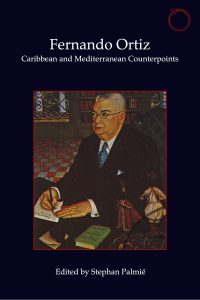Edited by Stephan Palmié
Cuban scholar Fernando Ortiz (1881-1969) coined the term “transculturation” in 1940. This was an early case of theory from the South: concepts developed from an explicitly peripheral epistemological vantage point, and launched as a corrective to European and North American theoretical formulations. What Ortiz proposed was a contrapuntal vision of complexly entangled processes that we, today, would conceptualize as cultural emergence.
Inspired by Ortiz, this volume engineers an unprecedented conversation between Mediterraneanist and Caribbeanist scholars. It harnesses Ortiz’s mid-20th century theoretical formulations to early 21st century issues pertinent to both regions, including migration, territorial sovereignty, and cultural diversity. The contributors explore this perspective (arguably formed during Ortiz’s youth in late 19th century Menorca) in a dialogue between scholars of the contemporary Caribbean and Mediterranean so as to enable novel analytics for both regions, and more broadly to probe the promises and limits of Ortiz’s contribution for contemporary anthropology.
“This collection is probably the most important collective effort to date to grapple with the contemporary significance of Fernando Ortiz’s work. The book inspects the biographical, structural and historical experiences that gave shape to Ortiz’s concept of ’transculturation,’ and then lets the concept loose on the two regions from which it sprung forth. It is an ambitious collective project that inspects the cultural and intellectual background of a concept and its critical potential for a comparative anthropology of the present.”
— Claudio Lomnitz, author of Death and the idea of Mexico and The return of Comrade Ricardo Flores Magón
Stephan Palmié is the Norman and Edna Freehling Professor of Anthropology at the University of Chicago. He is the author of Wizards and scientists: Explorations in Afro-Cuban modernity and tradition, The cooking of history: How not to study Afro-Cuban religion, and Thinking with Ngangas: What Afro-Cuban ritual can tell us about scientific practice – and vice versa, as well as being editor of several volumes on Caribbean and Afro-Atlantic anthropology and history.
© HAU Books, 2023
6″ x 9″, 550 pp.
$40
Buy this book from The University of Chicago Press
Stephan Palmié
Gerard Horta
Consuelo Naranjo Orovio
Jeffrey Kahn
Glenn Bowman
Ramon Sarró
Jorge Pavez Ojeda
Sergio O. Valdés Bernal
Amanda Villepastour
Elizabeth Pérez
Olivia Maria Gomes da Cunha
João Pina-Cabral
Roger Canals
Brian Campbell
Verena Stolcke
Verena Stolcke
Charles Stewart
